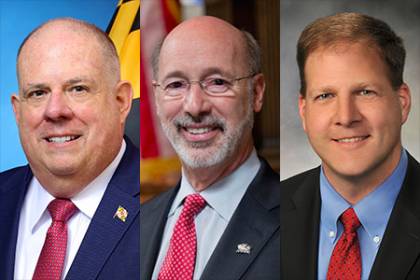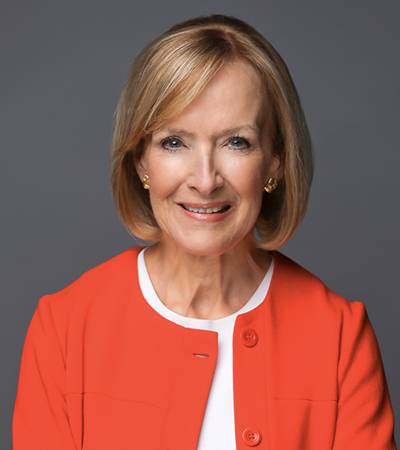Political discourse in America is increasingly marked by partisan and ideological disagreements, a widening gulf of opposing, entrenched worldviews that threatens to undermine the basic foundations of democracy.

Image caption: From left to right: Maryland Gov. Larry Hogan, Pennsylvania Gov. Tom Wolf, and New Hampshire Gov. Chris Sununu
At the highest level, portions of the federal government have been shuttered for more than three weeks—the longest shutdown in U.S. history—while leaders and lawmakers engage in a back-and-forth border wall debate, seemingly with no end in sight.
But divided government need not be dysfunctional government. That is the hopeful lesson from a handful of states that have elected popular governors whose political party differs from that of the majority party in their respective state legislatures.
Three such governors—Maryland Republican Larry Hogan, Pennsylvania Democrat Tom Wolf, and New Hampshire Republican Chris Sununu—will visit Baltimore's Stavros Niarchos Foundation Parkway Theatre at 7 p.m. on Jan. 28 for a discussion of how they propose working with their opposing-party legislatures and what is unique about their respective states.
The event, Divided Nation, United States, will be sponsored by Johns Hopkins University's Stavros Niarchos Foundation Agora Institute and presented by PBS NewsHour, which will broadcast the discussion live online as part of its NewsHour LIVE programming series. PBS NewsHour anchor and managing editor Judy Woodruff will moderate the conversation.
"What can we learn from these leaders? What can their politics and personalities tell us about what it takes to create cross-party dialogue and govern effectively in an era of hyper-partisan division?" said Elizabeth Smyth, adviser to the president on the SNF Agora Institute. "These are the kind of questions that the SNF Agora Institute is interested in exploring now and in the future."

Image caption: Judy Woodruff is the anchor and managing editor of the PBS NewsHour. She has covered politics and other news for more than four decades at NBC, CNN, and PBS.
Image credit: PBS
Hogan was recently elected to a second term as governor in a state that, historically speaking, is solidly blue. Voters registered as Democrats outnumber Republicans two to one, and the state last went for the GOP candidate in a presidential election in 1988.
Democrats have controlled both branches of Maryland's legislature every year since 1920, and Hogan is just the second Republican to hold the state's highest office since 1969. But he comfortably won re-election in November and is one of the nation's most popular governors—according to a Morning Consult poll released last week, 68 percent of Maryland voters approve of the job he is doing.
Wolf also won a second term in November, defeating Republican challenger Scott Wagner by 17 points, and he holds a 52 percent approval rating. Democrats outnumber Republicans statewide, but Pennsylvania went for Donald Trump in the 2016 presidential election, and the GOP has controlled both chambers of the Pennsylvania General Assembly for all but two two-year election cycles since 1994.
New Hampshire leans slightly Republican in terms of voter party affiliation but had a Democratic governor in all but two years from 1997 until 2017, when Sununu took office. He spent his first two years working with a GOP-controlled legislature, but Democrats gained control of both the state Senate and House during the most recent election cycle. He has a 60 percent approval rating, according to Morning Consult, fourth-highest among all governors.
The SNF Agora Institute was established in 2017 with a $150 million grant from the Stavros Niarchos Foundation. It serves as an academic and public forum dedicated to strengthening democracy by examining polarization and developing and testing new ways to support the open exchange of ideas. The institute will bring together a diverse group of scholars and practitioners to support these efforts.
The gift included funds for a new building that will offer space for research, reflection, collaboration, and public engagement tailored to the institute's mission.
The Jan. 28 governors forum is open to the public; advance registration is required. The event will also be shown live online by PBS NewsHour on its website and Facebook page.
Posted in Politics+Society
Tagged politics, snf agora institute








